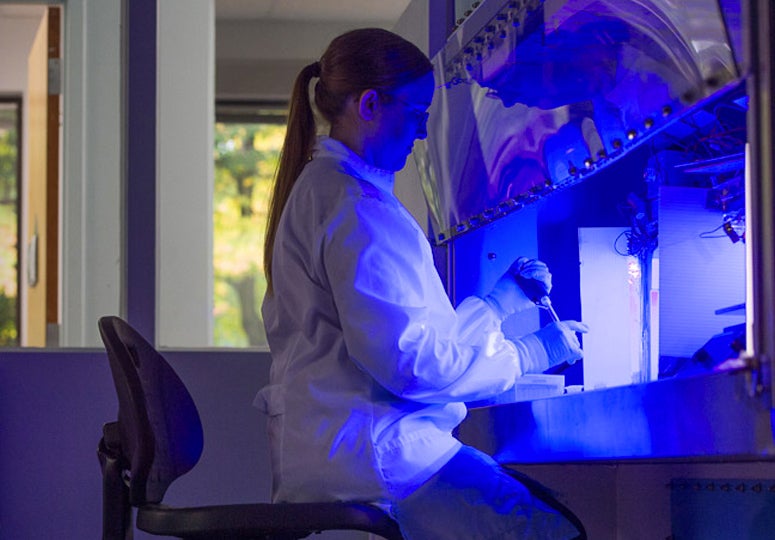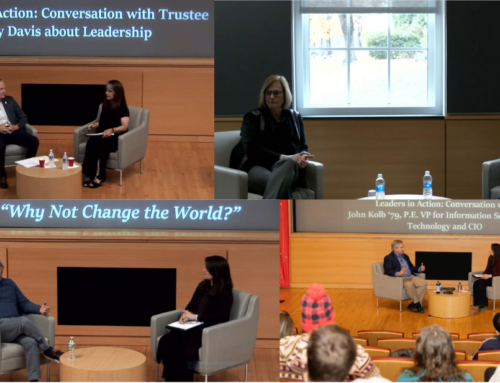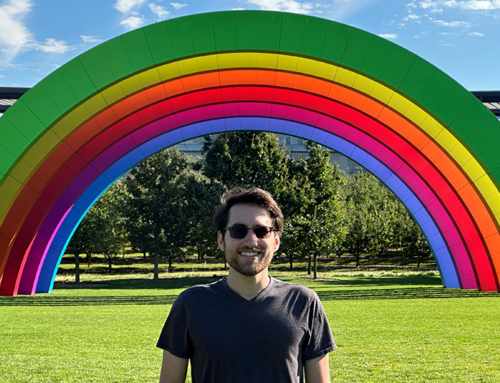
“People can now buy germ-killing lights powered by our technology.”
-Colleen Costello ’12
Hospital-acquired infections (HAIs) are a $20 billion problem in the United States. The fatality rate is staggering: Almost 1 million of the 1.7 million people that contract HAIs each year die from them.
Colleen Costello ’12 is on a mission to redefine the way we treat infection and enlighten us about the health benefits of her company’s patented, germ-killing technology. Costello’s company, Vital Vio Inc., develops and provides LED technology that safely disinfects indoor spaces by attacking a molecule specific to bacteria, mold, and fungi. It’s currently being marketed for home use, and in hospitals, ambulances, universities, and other commercial applications.
It all started in Costello’s junior year as a biomedical engineering student at Rensselaer. That’s the year her grandmother contracted MRSA after being admitted to the hospital following a minor fall. Her grandmother survived, but the experience awakened Costello to the devastating human and economic toll that MRSA, salmonella, E. coli, and other bacteria and harmful organisms take on people’s health.
Costello founded Vital Vio in 2012 with fellow Rensselaer alumnus James Peterson ’12 (he left the company in 2015). The initial idea, which was to use light safely in intravenous lines to kill bacteria, paved the way for a germ-killing technology with the potential to impact health care on a global scale.
Then-named Vital IV, the idea won the Rensselaer Change the World Challenge in 2011 and placed second in the Severino Center’s Business Plan competition in 2012. In 2013, as Vital Vio, the company captured $30,000 from the New York State Energy Research and Development Authority (NYSERDA), with an additional $350,000 from the authority in the following years. This early-stage funding opened up opportunities to move from the lab to the marketplace.
Rensselaer: An Important Resource
Today, Vital Vio employs 14 engineers, scientists, microbiologists, and business development professionals working at its headquarters in the Rensselaer Technology Park in nearby East Greenbush. Many of the team members are Rensselaer graduates, and more than 50 percent are women. Costello often speaks of the benefit of the company’s proximity to Rensselaer because it offers such a valuable pool of talent.
Vital Vio has closed on two multimillion-dollar funding rounds since 2016, including $1 million through New York state’s innovation fund. In April, the company’s proprietary technology received its fourth patent.
Costello has accrued a roster of accolades in only a few years, including Forbes’ “30 Under 30 in Enterprise Technology,” Inc.’s “Emerging Global Entrepreneurs to Watch” and “Most Brilliant Young Entrepreneurs,” Kairos Society’s K50, and Albany Business Review’s “40 Under 40.”
In June, in conjunction with her invitation from the Mayor of London’s office to participate along with 15 other women entrepreneurs in London Tech Week, Costello announced plans to expand into the European and UK markets.
We asked Costello:
How does the technology work?
I’d first like to say that harnessing the power of light to kill germs is not a new invention. Scientists in the 1890s used filters over sunlight for the same purpose.
We utilize a unique spectrum of light-to-target molecules that are in germs but not in human cells. This spectrum of light is delivered through proprietary VioSafe® technology. It initiates a photo-activation of porphyrin molecules found in microorganisms that leads to the production of Reactive Oxygen Species (ROS). In high doses, ROS cause irreparable damage to the cellular structure and lead to bacterial cell death.
Unlike the disinfecting UV light traditionally used in hospitals, people and pets can safely be in rooms with lights powered by Vital Vio’s germ-killing technology for as long as they need to be. These lights do not harm humans and are safe for continuous use.
What mentors supported you along the way?
I minored in technological entrepreneurship at Rensselaer, and (the late) Professor Burt Swersey’s guidance really helped me understand the importance of using technology to help others and change the world for the better.
We also continue to work with some of the researchers there, including Bob Karlicek, professor of electrical, computer, and systems engineering and director of the Center for Lighting Enabled Systems & Applications (LESA). He is also a member of Vital Vio’s advisory board.
Who are some of your customers?
We’re excited that people can now walk into Home Depot or go online to buy these germ-killing lights powered by our technology for their homes. Whenever I met with hospital administrators, infection control experts, facilities managers, athletics directors, and a host of other commercial clients about our products, inevitably they’d ask, “How can I get these for my own house?” We’ve partnered with Evolution Lighting of Miami, Florida, to create ellumi™ Lighting powered by our disinfecting VioSafe technology.
We’re now offering ellumi™ under-cabinet antibacterial LED lighting and a recessed shower light for reducing mold and mildew in showers, around the bathroom, and in other rooms in the house where germs are a problem. We are already hearing from people who are excited that their lights will help do the cleaning for them. Who doesn’t want help cleaning their bathroom! Amazon is selling both lights. The under-cabinet lights also are being sold through Wayfair, Houzz, and HomeDepot.com.
Some of our other commercial partners include Visa Lighting, with disinfecting lights for a range of industries including the education, athletics, and hospitality sectors, and Code 3, which manufactures lighting for emergency vehicles and now offers a patient compartment light powered by Vital Vio that continuously kills germs while illuminating the interior of ambulances.
LED lighting powered by our germ-killing technology can be found in places like Duke University’s athletic facilities and training rooms, UCLA Health intensive care units, the Metro West Fire Protection District in West St. Louis County, Missouri’s ambulances, and the Chicken & Rice Guys’ fleet of food trucks in Boston.
Costello shared five things she’s learned along the way:
Do what matters to you. Embrace the question, “Why not change the world?” Don’t fear failure. Prepare to manage through failure because failure WILL happen.
Make a plan. Progress doesn’t happen by accident.
Execute the details. Get in the game. Play three-dimensional chess. Look at the whole board and think several steps ahead. Consider the consequences of your move. Then make your play.
Network, network, network. Develop a diverse network and cultivate these relationships. Value differences and be open to other views.
Step away from the work. Take time for other things. Family, friends, outdoor activities, and other personal interests bring distance and, ultimately, a new perspective to your work.
Vital Vio employs 14 engineers, scientists, microbiologists, and business development professionals working at its headquarters in the Rensselaer Technology Park in nearby East Greenbush.




